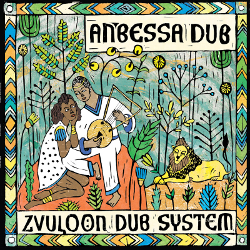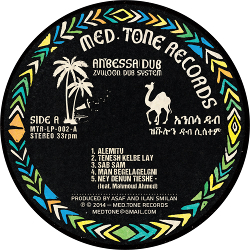Articles about reggae music, reviews, interviews, reports and more...
Zvuloon Dub System - Anbessa Dub

Zvuloon Dub System - Anbessa Dub
Exactly what young talented musicians who love vintage music should be doing - bringing together different styles to create something fresh.
Sampler
Tel Aviv’s Zvuloon Dub System have a more interesting grounding than your average non-Jamaican reggae enthusiasts. Their singer Gilli Yalo was born in Gondar, Ethiopia and left with his family as a child to walk through the desert in search of his religious homeland. When Zvuloon sing of Moses, Zion or the Promised Land they give it an extra literal meaning.
2012 debut album Freedom Time was carefully-studied foundation roots reggae – bar an intriguing transposition of Jimi Hendrix’s Voodoo Chile. As the global market fills up with young bands who play reggae as “back in the day”, Zvuloon have done something far more exciting for their second record – they’ve reached into Yalo’s Ethio-roots.
 Reggae and Ethiopian music together are not novel. Ethiopian artists Teddy Afro and Eyob Mekonnen have been singing reggae for years – as have expats such as Sweden’s Nazarenes. The UK-Ethio venture Dub Colossus has been active since 2008 (for those not put off by pun-believably awful titles like Town Called Addis) while California’s Foreign Key Records voiced Mykal Rose to Mulatu-Astatke-style brass on 2013’s EP Showdown Inna Bloody Town. Yet Anbessa Dub brings the fusion to a new level of seamlessness with its swooping, syncopated rhythms sung over in Amharic and Tigrinya. It's comparable to what London’s Soothsayers do with reggae and West African styles.
Reggae and Ethiopian music together are not novel. Ethiopian artists Teddy Afro and Eyob Mekonnen have been singing reggae for years – as have expats such as Sweden’s Nazarenes. The UK-Ethio venture Dub Colossus has been active since 2008 (for those not put off by pun-believably awful titles like Town Called Addis) while California’s Foreign Key Records voiced Mykal Rose to Mulatu-Astatke-style brass on 2013’s EP Showdown Inna Bloody Town. Yet Anbessa Dub brings the fusion to a new level of seamlessness with its swooping, syncopated rhythms sung over in Amharic and Tigrinya. It's comparable to what London’s Soothsayers do with reggae and West African styles.
Opening instrumental Alemitu starts with a groundswell of Lior Romano’s Hammond and Ilan Smilan’s guitar trill that recalls Jackie Mittoo’s 1978 instru-dub Disco Jack. Then Inon Peretz and Ilan Adiri’s cartwheeling horns slot neatly atop drummer Asaf Smilan’s swung one-drop beat and the template is set.
Much of the track-list is cover versions of Ethiopian material. There are reggae reworks of 70s classics in Muluqen Mellesse’s Tenesh Kelbe Lay (the song Asaf and Gilli first messed around with in studio to give rise to this project) and Tilahun Gessesse’s Yehoden Aweteche Lengeresh (although the original sounds remarkably reggae already).
Yallo also revisits Tsehaye Yohanne's 80s hit Sab Sam while Israel based singer Zemene Melesse guests on a recut of his own Endemenesh (originally recorded in 1986 with Ethiopia’s legendary Roha band). Man Begelagelgni is an unreleased composition from another Israel resident Aklilu Seyoum – given to the group by his family after he died.
 Then there are Zvuloon originals such as Ney Denun Tieshe featuring the mighty veteran Mahmoud Ahmed (interestingly the Jerusalem-raised Yalo doesn’t have the characteristic vibrato of Ahmed and Melesse). Final track Yene Almaz’s Nyabinghi style rhythm uses traditional East African instruments including the Masinko - the Eastern variant of the one string violin known in Mali as the Soukou (played by former Addis National Theatre Orchestra member Dejen Manchelot).
Then there are Zvuloon originals such as Ney Denun Tieshe featuring the mighty veteran Mahmoud Ahmed (interestingly the Jerusalem-raised Yalo doesn’t have the characteristic vibrato of Ahmed and Melesse). Final track Yene Almaz’s Nyabinghi style rhythm uses traditional East African instruments including the Masinko - the Eastern variant of the one string violin known in Mali as the Soukou (played by former Addis National Theatre Orchestra member Dejen Manchelot).
An update of Okbay Mesfin’s Tisbukti Fetret bearing the distinctive “scuffed glass” sound of Yacov Lilay’s Krar – “the Harp of David” – is a particular standout. Also Zele Zele, a lithe sinuous skank peppered with Syn-drum and snaked with fuzzy, frowsy synth.
Like Freedom Time the all-analogue studio and shimmering guitar, organ and horn tones transport you from the coldest climes to the blazing sun. It's exactly what young talented musicians who love vintage music should be doing - mixing different styles to create something fresh.
Read more about this topic
Comments actually desactivated due to too much spams
Browse by categories
Recommended Articles
Latest articles
Recently addedView all
© 2007-2024 United Reggae. All Rights Reserved. Reproduction in whole or in part is prohibited. Read about copyright
Terms of use | About us | Contact us | Authors | Newsletter | A-Z














